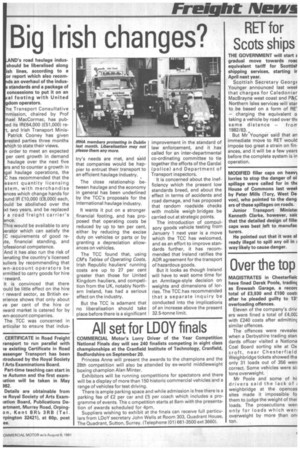Big Irish changes?
Page 7

If you've noticed an error in this article please click here to report it so we can fix it.
ND's road haulage indusshould be liberalised along ish lines, according to a or report which also recomds an overhaul of the induss standards and a package of concessions to put it on an al footing with United gdom operators.
he Transport Consultative mission, chaired by Prof hael MacCormac, has pubed its 1R£64,000 (£51,000) re1, and Irish Transport MinisPatrick Cooney has given rested parties three months hich to state their views.
order to meet an expected per cent growth in demand haulage over the next five rs and to counter a growth in gal haulage operations, the C has recommended that the esent quantity licensing stem, with merchandise nces which change hands for und IR £10,000 (£8,000) each, ould be abolished over the xt two years, and be replaced a road freight carrier's ence.
This would be available to any erator which can satisfy the C requirements of good rete, financial standing, and ofessional competence.
And it has also run the risk of ienating the country's licensed uliers by recommending that n-account operators be larmitted to carry goods for hire reward.
It is convinced that there 'ould be little effect on the hire r reward sector, as British exerience shows that only about ye per cent of the hire or ;ward market is catered for by wn-account companies.
The TCC was concerned in articular to ensure that indus try's needs are met, and said that companies would be happier to entrust their transport to an efficient haulage industry.
The close relationship between haulage and the economy in general has been underlined by the TCC's proposals for the international haulage industry.
It wants it put on a stronger , financial footing, and has proposed that operating costs be reduced by up to ten per cent, either by reducing the excise duty on vehicles or parts or by granting a depreciation allowances on vehicles.
The TCC found that, using CM's Tables of Operating Costs, Irish Republic hauliers' running costs are up to 27 per cent greater than those for United Kingdom hauliers, and competition from the UK, notably Northern Ireland, has had a serious effect on the industry.
But the TCC is adamant that no liberalisation should take place before there is a significant improvement in the standard of law enforcement, and it has called for an inter-departmental co-ordinating committee to tie together the efforts of the Gardai (police) and Department of Transport inspectors.
It is concerned about the inefficiency which the present low standards breed, and about the effect in terms of accidents and road damage, and has proposed that random roadside checks with mobile weigh bridges be carried out at strategic points.
The introduction of compulsory goods vehicle testing from January 1 next year is a move which the TCC has welcomed, and as an effort to improve standards further, it has recommended that Ireland ratifies the ADR agreement for the transport of hazardous goods.
But it looks as though Ireland will have to wait some time for an Armitage-style decision on weights and dimensions of lorries. The TCC has recommended that a separate inquiry be conducted into the implications of an increase above the present 32.5-tonne limit.














































